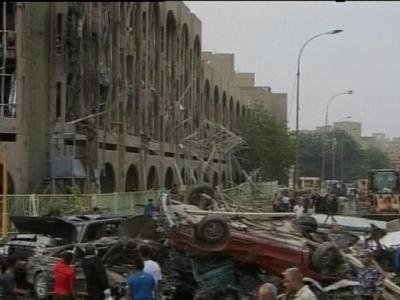BAGHDAD – A pair of suicide car bombings Sunday devastated the heart of Iraq's capital, killing at least 147 people in the country's deadliest attack in more than two years. The bombs targeted twogovernment buildings and called into question Iraq's ability to protect its people as U.S. forces withdraw.
The bombings show that insurgents still have the ability to launch horrific attacks even as violence has dropped dramatically in Iraq. Many fear such attacks will only increase as Iraq prepares for crucial January elections.
The dead included 35 employees at the Ministry of Justice and at least 25 staff members of the Baghdad Provincial Council, said police and medical officials speaking on condition of anonymity because they were not authorized to speak to the media. At least 721 people were wounded, including three American contractors.
The street where the blasts occurred had just been reopened to vehicle traffic six months ago. Shortly after, blast walls were repositioned to allow traffic closer to the government buildings. Such changes were touted by Iraq's Prime Minister Nouri al-Maliki as a sign that safety was returning to the city.
The Iraqi leader walked among the mangled and blackened cars, which lay in front of blast walls that had been decorated with peaceful street scenes of Iraq. At the Justice Ministry, windows and walls on both sides of the street were blown away, and blood pooled with water from burst pipes.
Al-Maliki has staked his political reputation and re-election bid on his ability to bring peace to the country and pledged to punish those responsible, who he said wanted to "spread chaos in the country, undermine the political process and prevent the holding ofparliamentary elections." But the Sunday attacks seemed designed to paint the Iraqi leader as incapable of providing security to the beleaguered city, undermining much of his political support.
The attacks occurred just hours before Iraq's top leadership was scheduled to meet with heads of political parties in order to reach a compromise on election guidelines needed to hold the January vote.
President Barack Obama, who earlier this week reaffirmed the U.S.'s commitment to withdrawing its troops from the country, called al-Maliki to offer his condolences.
"These bombings serve no purpose other than the murder of innocent men, women and children, and they only reveal the hateful and destructive agenda of those who would deny the Iraqi people the future that they deserve," Obama said.
The fact that the vehicles were able to get into an area home to numerous government institutions — just hundreds of yards from the heavily fortified Green Zone where the U.S. Embassy and the prime minister's office are located — sparked demands that those in charge of the city's security be held accountable.
"Those responsible for security and intelligence should be checked and interrogated," said Sunni Iraqi lawmaker Wathab Shakir. "Why should innocent people be killed?"
The initial investigation suggested the vehicles, each loaded down with more than 1,500 pounds of explosives, might have passed through some security checkpoints before hitting their destination, said Maj. Gen. Qassim al-Mousawi, a spokesman for the city's operations command center.
There have been no claims of responsibility so far, but massive car bombs have been the hallmark of the Sunni insurgents seeking to overthrow the country's Shiite-dominated government. Iraq has accused members of the outlawed Baath Party living in neighboring Syria of being behind another series of deadly bombings in August that also targeted government buildings. Al-Maliki blamed the attacks on Baathist and Al-Qaida.
Black smoke billowed from the frantic scene, as emergency service vehicles sped to the area. Many of the wounded were loaded into the back of trucks and into civilian cars because there were too many for ambulances to carry.
"The walls collapsed and we had to run out," said Yasmeen Afdhal, 24, an employee of the Baghdad provincial administration, which runs the city. "There are many wounded, and I saw them being taken away. They were pulling victims out of the rubble, and rushing them to ambulances."
The provincial council is the city government, which oversees a broad range of city services such as garbage collection, electricity, distribution of fuel for generators and school maintenance.
U.S. troops were also called in at the request of the Iraqi government to help secure the area, deal with any explosive material and offer forensics personnel to assist in the investigation, said a military spokesman, Maj. Dave Shoupe.
The coordinated bombings were the deadliest since a series of massive truck bombs in northern Iraq killed nearly 500 villagers from the minority Yazidi sect in August 2007. In Baghdad itself, it was the worst attack since a series of suicide bombings against Shiite neighborhoods in April 2007 killed 183.
Three American security contractors working for the U.S. Embassy in Baghdad were injured in the blasts, said Philip Frayne, an embassy spokesman. Frayne could not immediately provide details about who the contractors were escorting, which company they worked for or the nature of their injuries.
The explosions were just a few hundred yards from Iraq's Foreign Ministry, which is still rebuilding after massive bombings there in August. The bombings were a devastating blow for a country that has seen a dramatic drop in violence since the height of the sectarian fighting in 2006 and 2007.
On the streets of Baghdad, many Iraqis were angry at what they described as a lapse in security and wary about what will happen when U.S. forces leave.
"Everyday, we hear statements from different government officials that our forces are ready to control the situation on the ground when the U.S. forces withdraw," Zahid Hussain Najim said. "But day after day it has been found that these officials are either liars or have no idea about what's going on outside their offices."









